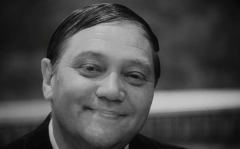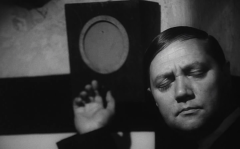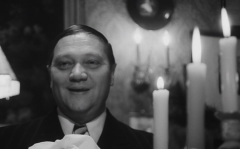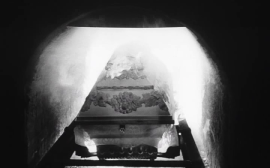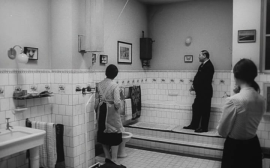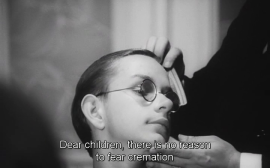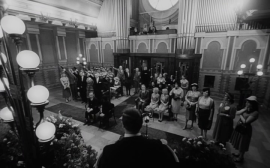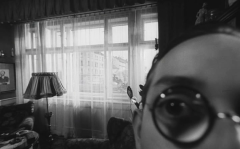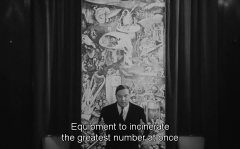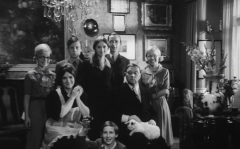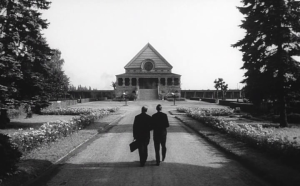Review by Bastian Gottbehüt
Meet Karl Kopfrkingl, loving husband, father of two kids, spiritually enlightened, … the next Dalai Llama, and serial killer.
(Some ‘spoilers’ here, but a lot left for you to discover, too.)
‘Spalovac Mrtvol‘ had been on my to-watch list for quite some time, without me having any recollection of how it got there and what it is about when I sat down to finally watch it about two hours ago. That said, Juraj Herz’s Kopfrkingl caught me totally off guard. You expect some strangeness once you know what the Czech title means, of course, but nothing can prepare you for the depths and dark places this film takes you to.
From start to finish, the camera stays (more or less) pinned to Kopfrkingl’s round and eerily dignified face; we follow him whereever he goes – to work, to buy more pictures for his home, to the whorehouse, to the doctor to have his blood examined for diseases – and more than once do we thus miss the moment where he ceases to be at one place and starts being at another. Rudolf Hrusínský has turned in one of the most memorable performances known to me, making you loathe, despise, pity, and lough at him all at the same time.
The longer we follow him, the more he emerges as a showcase of what Hannah Arendt presumably meant with her idea of the ‘banality of evil.’ (That I watched the recent film about her and now ‘Spalovac Mrtvol’ is mere coincidence, however.)
Kopfrkingl used to be a modestly proud Czech citizen, speaking only Czech at home and keeping only books in said language. He fulfills his duties at work with utmost conscientiousness and devotion, imagining a logical connection between a just and wise society which maintains laws on cremation, the moral beauty of that process, the technological advancement, and, finally, the Tibetan ‘Book of the Dead‘ (of all possible choices). His rather strange disposition, his obsession with reincarnation (which he never tires to sermonise about in front of others), his inability, even, to end the lives of two carps intended for a festive meal, would probably be harmless, if his mind wasn’t feeble and the times he lived in not the late 1930s in Czechoslovakia.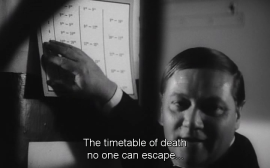
Soon after the start of the film we get to know him as a strange, but well-meaning man who is kind and affable to everyone he meets – old and young people, non-smokers, everyone in-between – and he doesn’t care about matters of blood, of heritage, or who is Jewish and who is of supposedly heroic Germanic origin. All he cares about is the art of cremating people. Which is where the Henleinist Walter Reinke, his proposal to Kopfrkingl to join ‘the party,’ the Nazis, gas chambers, mass crematoriums and the Holocaust come in.
The doubts Kopfrkingl has at first, his questions about blood and heritage, about some people he knows, soon give way to higher visions, first, simply, of climbing up the professional ladder, for which he needs to join ‘the party,’ spy on celebrating Jews, fire Jewish employees, and generally get rid of any Jewish connections. It soon becomes obvious, however, that these worldly motifs are not what really moves Kopfrkingl. In a particularly eerie nod to some of the Nazi’s occupation with Tibetan occultism, Kopfrkingl believes that killing, and cremating, people will ‘save them from suffering.’ The more who can be cremated, the better. With the best b/w avantgardist camerawork has to offer, Juraj Herz takes us deep into the deranged megalomaniac mind of a man who converses with his other self clad in Buddhist robes, proclaiming him the next Dalai Llama, leaving behind him a gruesome path of blood. Little of this blood is actually shown, of course. This film wants to make you think, not judge the accuracy of fight scenes. 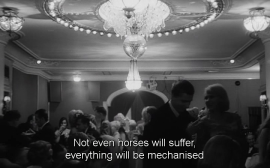
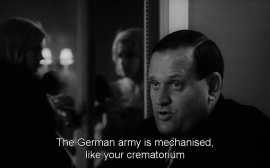
The degree to which Kopfrkingl is meant to be an example of Czech (and/or Sudetendeutsche) collaborators and of the idea of the mundane and mechanical follower of orders and ideologies who ends up facilitating mass murders is debateable. The less Kopfrkingl appears to be sane but stupid, the more he seems to be delusional and mad, the more the character loses the ability to personify those people who indeed willingly joined the Nazis in their intent to extinguish the world’s Jewry. These people were not insane monsters, they were abettors too weak, stupid, desperate, willing or able to know what they were doing. Herz, however, might just as well have intended Kopfrkingl and his (at times) even psychedelic depiction not as a precise psychological study of evil, but as an illustration of how the metamorphosis of people like Kopfrkingl must have appeared to their victims. History may – and should – rationalise the horrors of the Holocaust, but to the people who fled from men like Kopfrkingl or fell victim to his philosophy of ‘saving souls’ he must have appeared an incarnation of insane horror.
‘Spalovac Mrtvol’ is one of the most impressive films I’ve seen in a long time. It will not make you feel good about mankind, rather it will make you feel uneasy and shocked from start to finish with growing intensity. Apart from the point that it stayed vague on whether it intended to deal with collaboration in general or with Kopfrkingl’s character in particular, this is a near-perfect film. It has so much more to tell than could be dealt with here. There are several other layers of meaning to be discovered, like metaphorical scenes employed by Herz to foreshadow what would await those around Kopfrkingl, and also the significance of the other protagonists.
